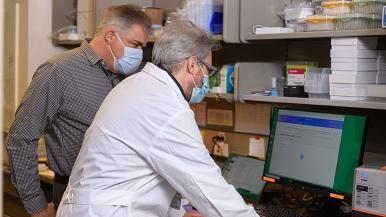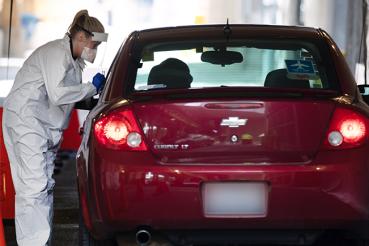Illinois’ first known COVID-19 case caused by the omicron COVID-19 variant was identified by the Regional Innovative Public Health Laboratory at Rush University Medical Center through genomic sequencing analysis.
The variant was identified in a Chicago resident who was a known contact of a confirmed omicron case in another state, who visited the city, the Illinois Department of Public Health (IDPH) and the Chicago Department of Public Health (CDPH) announced on Dec. 7.
According to CDPH and IDPH, this Chicago resident — fully vaccinated with a booster dose — did not require hospitalization, is improving and has been self-isolating since their symptoms began, officials said. Public health officials continue to perform contact tracing, and additional information about the individual is not available to protect their identity and health information, officials said.
Through a partnership with CDPH, the Regional Innovative Public Health Laboratory (RIPHL) collects sample of specimens from 16 hospitals across Chicago and conducts genomic analyses. CDPH is part of statewide and national efforts to monitor, track and understand SARS-CoV-2 variants, and IDPH laboratories continue to perform genomic sequencing of positive specimens to identify any variants, including omicron.
“By tracking SARS-CoV-2 in Chicago, we can detect changes in the virus that will help us to respond to COVID-19, locally and globally,” said Mary Hayden, MD, co-principal investigator of the Regional Innovative Public Health Laboratory at Rush and professor of infectious disease at Rush Medical College. “Rush’s work with the CDPH and other partnerships like it across the country are vital to public health, as the pandemic has made crystal clear.”
Stefan Green, PhD, co-principal investigator of RIPHL and director of Core Laboratory Services at Rush University, said finding the first omicron sample is only a start to monitoring the variant. "It's just a single case at the moment," Green said in an interview with NBC 5. "We are increasing the number of samples in our surveillance to get a better idea of omicron's presence in Chicago," and to understand how rapidly the new variant is spreading.
Variant of concern
South African authorities were the first to report the omicron variant (B.1.1.529) to the World Health Organization on Nov. 24, with retroactive testing confirming the variant to be present in Europe at least five days prior. Earlier this month, Rush virologist Hannah Barbian, PhD, explained how COVID-19 samples are analyzed and how scientists would look for the variant.
“We know its genome sequence, which we will be able to detect and monitor in our lab,” Barbian, a member of the RIPHL team, said earlier this month. “We don’t yet know exactly what those mutations mean, but that number of mutations means there is more to study in terms of how the virus spreads or behaves. The biggest questions now are ‘Is this virus more transmissible?’ and ‘Does this virus evade antibody responses?’ We don’t know either yet, but scientists are working really hard to figure that out.”
The variant has been found in more than three dozen countries worldwide, contains a large number of mutations, and has been classified as a variant of concern by the World Health Organization and Centers for Disease Control and Prevention.
Reminder of 'ongoing threat'
Public health officials and Rush physicians and scientists have been anticipating detection of this variant and expect more cases to be reported in the coming days and weeks.
“While unsurprising, this news should remind Chicagoans of the ongoing threat from COVID-19, especially as families prepare to come together over the holidays,” said CDPH Commissioner Allison Arwady, MD. “We know how to slow the spread of this virus: Get vaccinated, get boosted, get tested if you have symptoms or have been in contact with someone with COVID-19, and stay away from others if you test positive. Wear a mask indoors, avoid poorly ventilated spaces, practice social distancing, and wash your hands.”
Rush infectious disease specialists encourage everyone age 5 and older to get vaccinated against COVID-19 and urge all adults to get their COVID-19 boosters as recommended by the CDC to increase the likelihood that the vaccine will provide immunity to the omicron variant.
The first case in the United States was reported on Dec. 1. While there are concerns about how quickly this variant has emerged and spread in South Africa, much remains to be learned about how it behaves, and public health agencies are working closely with the CDC to monitor the situation, officials said.
“Public health experts and scientists worldwide continue to study the newest variant, omicron, to determine if it spreads more easily, causes more severe illness, and how effective the current vaccines are against it,” said IDPH Director Dr. Ngozi Ezike. “While we don’t have all the answers right now, we know the general prevention strategies we’ve been recommending — vaccination, boosters, masking, testing, physical distancing — are our best protection against the virus and its variants. As long as the virus continues to circulate, it has the potential to mutate into new variants. Vaccination can help stop circulation, but we need more people to get vaccinated.”
'Get your vaccine, get your booster'
Illinois Gov. J.B. Pritzker echoed that sentiment.
“Scientists need time to learn more about the omicron COVID-19 variant, but in the meantime, we already know how to be vigilant,” he said. “So get your vaccine, get your booster, wear your mask indoors, wash your hands, and get tested for COVID-19 if you feel sick or have been exposed to someone who tested positive. I encourage all Illinois residents to make a plan for how to best protect themselves and their loved ones, especially in the holiday season.”
To find the most recent updates on COVID-19 and the omicron variant, or to find your COVID-19 vaccine, visit Chicago.gov/COVIDvax in Chicago and dph.illinois.gov/covid19.html throughout Illinois.
"The city and CDPH continue to closely monitor the omicron variant and work with medical experts to better inform our residents,” Chicago Mayor Lori Lightfoot said. “To meet the urgency of this moment, it’s crucial that our residents continue to get vaccinated and receive their booster shot. We are committed to distributing the vaccine as widely and equitably as we can across our city through community-based clinics, city-run clinics, and our recently expanded Protect Chicago At Home program.”




